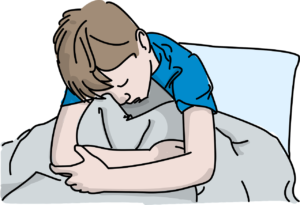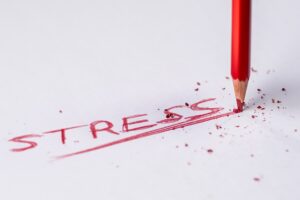 Life is full of stress. It is common to everyone. Some people are able to handle stress better than others while many cannot cope with the stress that comes with everyday modern living. Stress can affect the well-being of both one’s physical and mental health. Physical stress occurs when a person does not have enough rest, engaging in exercises to the extreme limit of bodily endurance, has a poor diet, or suffers from illness and disease. Mental stress may arise from worries about matters such as money, jobs, retirement, marriage, or the death of loved ones. Sometimes the stress that arises is subtle, and a person may not even realize she is experiencing it. For example, one may feel tired and overwhelmed after a hard day’s work. This fatigue may be a result of either physical or mental stress or a combination of both. Either way, the body is taxed to some degree.
Life is full of stress. It is common to everyone. Some people are able to handle stress better than others while many cannot cope with the stress that comes with everyday modern living. Stress can affect the well-being of both one’s physical and mental health. Physical stress occurs when a person does not have enough rest, engaging in exercises to the extreme limit of bodily endurance, has a poor diet, or suffers from illness and disease. Mental stress may arise from worries about matters such as money, jobs, retirement, marriage, or the death of loved ones. Sometimes the stress that arises is subtle, and a person may not even realize she is experiencing it. For example, one may feel tired and overwhelmed after a hard day’s work. This fatigue may be a result of either physical or mental stress or a combination of both. Either way, the body is taxed to some degree.
 The Hypothalamic-Pituitary-Adrenal (HPA) axis is one of the major systems in the human body involved in stress response. Activation of the HPA axis by stress leads to physiological changes which improve the body’s ability to adjust to both internal and external changes brought on by the stress. These changes will increase its chance of survival. There will be a rise in blood pressure, heart rate, respiration, metabolism, and blood flow to the muscles. This is the “fight or flight” response known to be associated with stress. However, if the stressful condition persists over a prolonged period, the HPA system can become overly taxed and may break down. When this occurs, the human body becomes vulnerable to pathology and diseases.
The Hypothalamic-Pituitary-Adrenal (HPA) axis is one of the major systems in the human body involved in stress response. Activation of the HPA axis by stress leads to physiological changes which improve the body’s ability to adjust to both internal and external changes brought on by the stress. These changes will increase its chance of survival. There will be a rise in blood pressure, heart rate, respiration, metabolism, and blood flow to the muscles. This is the “fight or flight” response known to be associated with stress. However, if the stressful condition persists over a prolonged period, the HPA system can become overly taxed and may break down. When this occurs, the human body becomes vulnerable to pathology and diseases.
 The Hypothalamic-Pituitary-Adrenal (HPA) axis and the ovaries are intricately linked, and studies have indicated that ovarian functions can be adversely affected by stress via the HPA axis. With stress, the body produces more stress hormones such as cortisol at the expense of female sex hormones. The estrogen level can be reduced to a level that suppresses menstruation. This shift towards survival mode in a stressful situation can result in hormonal imbalance that can alter sex drive, menstruation, fertility, and the general wellbeing of the woman.
The Hypothalamic-Pituitary-Adrenal (HPA) axis and the ovaries are intricately linked, and studies have indicated that ovarian functions can be adversely affected by stress via the HPA axis. With stress, the body produces more stress hormones such as cortisol at the expense of female sex hormones. The estrogen level can be reduced to a level that suppresses menstruation. This shift towards survival mode in a stressful situation can result in hormonal imbalance that can alter sex drive, menstruation, fertility, and the general wellbeing of the woman.
The effects of stress are many and varied. The corticotropin-releasing hormone (CRH), an important hormone released through the HPA axis, can potentially increase the production of fatty secretions in the sebaceous glands, which in turn can predispose to acne outbreaks. Stress is also known to significantly decrease the body’s healing abilities which results in the prolongation of such acne outbreaks. The hormonal shift may also result in an increased production of androgens (male hormones) from the ovarian theca cells. This is known as the ‘hyper-androgenic state’, and this state often gives rise to seborrhea, hirsutism, and acne.
 The recovery prognosis for women with reproductive function disorders caused by stress is excellent. Early recognition and appropriate therapy employing the correct stress management strategy is an important first step in reversing such disorders. Much of everyday stress can be managed by adhering to simple measures such as getting adequate rest and sleep, good nutrition, and partaking in enjoyable hobbies. Maintenance of appropriate weight is also crucial for optimal reproductive function and in reducing physical stress on the body. Take time out to rest, relax, and do something that you enjoy. Make time for some form of physical activity.
The recovery prognosis for women with reproductive function disorders caused by stress is excellent. Early recognition and appropriate therapy employing the correct stress management strategy is an important first step in reversing such disorders. Much of everyday stress can be managed by adhering to simple measures such as getting adequate rest and sleep, good nutrition, and partaking in enjoyable hobbies. Maintenance of appropriate weight is also crucial for optimal reproductive function and in reducing physical stress on the body. Take time out to rest, relax, and do something that you enjoy. Make time for some form of physical activity.
 An illustration of stress management strategy might be the following: a glass of water does not seem very heavy if you hold it for only a few minutes. However, if you continue to hold it, the glass will feel progressively heavier with the passing of time until you feel you cannot support its weight much longer. You might even feel pain in your arm. To correct this increasingly stressful state, all you need to do is to put the glass down, relax awhile and pick it up again later. The glass need never feel heavy again. Therefore, when you feel overly stressed, stop and relax. Continue with your activities once you feel better and are recharged again. When stress disappears, the human body will revert back to its baseline physiological level. Likewise, the hormonal axis will be restored to the normal balance required for optimal reproductive function.
An illustration of stress management strategy might be the following: a glass of water does not seem very heavy if you hold it for only a few minutes. However, if you continue to hold it, the glass will feel progressively heavier with the passing of time until you feel you cannot support its weight much longer. You might even feel pain in your arm. To correct this increasingly stressful state, all you need to do is to put the glass down, relax awhile and pick it up again later. The glass need never feel heavy again. Therefore, when you feel overly stressed, stop and relax. Continue with your activities once you feel better and are recharged again. When stress disappears, the human body will revert back to its baseline physiological level. Likewise, the hormonal axis will be restored to the normal balance required for optimal reproductive function.
 However, for difficult cases, especially those involving hypo-estrogenic (low estrogen level) women who do not respond to stress management steps, hormone therapy may be required to provide protection against bone loss and cardiovascular problems. Medications should not be the long-term goals and other non-medication strategies should be instituted at the same with the hope that the medication can be weaned off in the future.
However, for difficult cases, especially those involving hypo-estrogenic (low estrogen level) women who do not respond to stress management steps, hormone therapy may be required to provide protection against bone loss and cardiovascular problems. Medications should not be the long-term goals and other non-medication strategies should be instituted at the same with the hope that the medication can be weaned off in the future.
 Modern women are now facing increasing stress at many levels – in school, at the workplace, the responsibility of raising a family, as carers for elderly family members and when growing old. One should remember that taking care of health should also include a strategy for stress management. It is not easy but can be done if the woman realizes that stress may be part of the contributing factors to a poor reproductive health. Hence, early and timely intervention may go a long way in helping women to regain back their hormonal balance and reproductive function.
Modern women are now facing increasing stress at many levels – in school, at the workplace, the responsibility of raising a family, as carers for elderly family members and when growing old. One should remember that taking care of health should also include a strategy for stress management. It is not easy but can be done if the woman realizes that stress may be part of the contributing factors to a poor reproductive health. Hence, early and timely intervention may go a long way in helping women to regain back their hormonal balance and reproductive function.
To print a pdf copy, click HERE
[mailerlite_form form_id=3]

